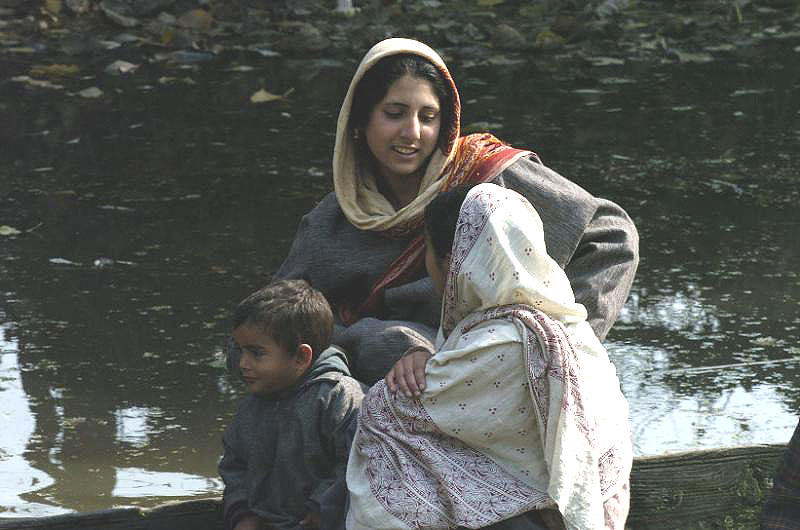This is a land where roses have lost their red and the grass has forgotten it’s green.
The water in the lake has the stillness of death, except for an occasional ripple when the oars of a shikara slice through the shining film on its surface.
The trees lose their leaves faster than they could grow, and their barks are hollow and cracked, as if waiting to fall by the might of a single whisper.
The sky? It’s just like the life in this valley- grey and dark, except for an occasional ray of sunshine that flashes as if by accident. And before you could blink or squint to see if it’s for real, it’s gone.
Welcome to Kashmir, formerly known as paradise on earth. Now, there’s no name for it. It’s just a tract of land torn to pieces from all sides. Only a faded mirage of its ethereal beauty now remains, like the laugh lines on the cheeks of a young woman turn into wrinkles as age sets in. When this remainder of beauty will go away is only a question of time. Or maybe, it’s the answer.
I was posted here some 41 days ago, transferred from the Nepal border down in the East. I remember coming here with the same tingling sensation in my fingertips and the same lump in my throat that I know many others before me have come with. We had all heard tales of this land- its haunting beauty, its serenity, the scented winds that blew and the paintings in the sky from the very hand of the painter who made that thing called color. That’s why the tingling in my fingertips. And the lump in my throat was because I was to see what I was to see. We soldiers have seen more than our lifetime’s worth of death and pain, but that’s different. The first breath of air I took as I entered the valley of Kashmir shook the very foundations of what the words ‘death’ and ‘pain’ meant to me.
What would you call a child who drags a little toy with his shoulders drooping and knees heavy, as if he were a hundredfold his age?
What would you do to an old woman who stands in front of you with her arms spread, her chest bare, surrendering to a dignified rape or a noble death, anything but this pathetic excuse for a life?
What name would you give to the time of the day when there is a silence which is by no means sleepy or even awake? All that is visible is smoke in the sky, which has, over long years, taken the place of clouds.
Maybe it’s because I’m new to this place, or maybe because that’s how I am, that the unexpected happened. Two days ago, I made the one mistake I shouldn’t have; at least not here, not in this land, not in this time. This, the very land that God himself hath created and forgotten, and I had the blasphemy to do the unforgivable. I fell in love.
There are all kinds of activities that go on here, some so grotesque that I wouldn’t even be able to describe them in human vocabulary and save myself the torture of reliving it. But all that is passé. It’s old news. There’s nothing ‘sensational’ about them any more. This thing called love, however, is unforgivable here. And you pay a heavy price for it. Your heart, and maybe a piece of your soul. Both are ripped away without consent.
The first time I saw her was about a week ago, when we had stopped a bus for an ID check. Those with IDs would be pushed forward as if they were nothing but dumb sheep with red marking. Those without them would be allowed to proceed no further, and with one step out of line, they would be shot in the head. Our fingers were always on the trigger, that’s the first rule of being a soldier in Kashmir.
She had stepped out of her bus with her daughter and baby boy and promptly produced all their IDs after a customary salaam. I grunted with approval and dismissed her. She was just one of them, she didn’t deserve another look. I kept checking. There were two young men without IDs that day, whom we shot dead just as they fidgeted with their hands near their pockets. Who knows, they might have been seconds away from brandishing a weapon or signaling to a militant hidden in the mountainous terrain. Their bodies were cleared away like vegetable peels outside a food-house in minutes and the bus proceeded as if nothing out of the ordinary had happened.

The last thing I remember seeing was the woman’s eyes staring in the distance from inside the bus. A few long strands of brown hair blew with the wind and her large earrings dangled to and fro, lightly touching the window grill of the bus. I thought she deserved a second glance then. It was because of her eyes. They were hard as stone. And they peered into the distance looking for something. It wasn’t respite; it wasn’t relief; for she would find none of that here, try as she might. I don’t know what it was they were looking for. She probably didn’t either.
*
The woman with a daughter and a baby boy occupied a few minutes on my lonely mind before the change in evening guard duty happened. Then she was forgotten as I took to attention with a resolute salute.
But it was precisely two days ago that the mistake I talk about happened. It was two days ago that I gave her not only a second glance, but all of my heart and a piece of my soul too.
There had been an explosion. It was the first in eight days, so we were on high alert. It was a ‘delicate’ situation just after a blast, because a blast could mean anything- a new consignment of weapons in the area, militants on the move, a rebellion, a distraction or cover-up of something worse or just another extra-ordinary day. And a blast is followed by a curfew. Immediately. It goes without saying. So, anybody running or brandishing a weapon or even raising their voice in the vicinity is shot dead instantly. If they are lucky, that is. Otherwise, they would be tortured for weeks for information, news or just vindictive indulgence.
This time, we had lost three of our army men in the explosion. And we were furious. Who wouldn’t be?
We had begun firing. Window panes were shattered. Tyres, sticks, blood-caked shawls, pieces of glass and other debris were strewn about. There were screams and shrieks, mixed with grief and pain that penetrated the thick clouds of smoke from burning buildings. And it was at that precise moment, when I saw the woman and our eyes met that it happened. That one moment was all it took.
She sat with her back to a wall, holding her little son in her arms. From what I could see, the little baby’s legs had been blown off. I do not know if he was dead or alive. And in front of the woman, immobile, was her little daughter amidst corpses of two other children in dry blood. The daughter was dead for sure.
I do not know if she had finished screaming or had not screamed at all, but our eyes met for an instant. I was in a uniform, the same as many of the others holding rifles. I might as well have been the one responsible for this. But I also might not be. It could have been the militants, those unholy predators who kill people from both sides, provoking the fire to burn deeper into the heart of this valley and keeping the wounds fresh and sore even after half a century.
There is another hard lesson an army man learns, sometimes with practical experience.
No bullet asks for permission before tearing apart the thin walls of human flesh.
No bomb goes off taking care to blow apart just the window panes and the brickwork of a building that was once a home.
And no drop of blood appears different from any other in an undignified pile of human bodies, uniformed or otherwise.
It was at that moment, two days ago, when our eyes met. She looked at me, and again, her eyes did not know what to search for. They were wet with tears but hard as stone. They didn’t know whether to blame me for her heart wrenching loss, or look for sympathy from a man stationed here for the security of the very life she had no reason to continue living. So I answered with both.
Yes, my eyes were guilty. And yes, they were sympathetic.
I obliged her for a second then looked away. I tightened my grip on the rifle, cautious to any movement around the alley where the explosion had taken place and got on with my duty. One moment of sharing the gaze and I could face her no more. I turned away.
But in the last fraction of that moment, just before our eyes tore away from each other, I felt something leave me.
*
Today, as I am waving my hand and bringing another bus to a grinding halt, I know what had left me two days ago.
Now I know it in the back of my mind, as I see another bunch of terrified, nervous, silent Kashmiris get down from the bus with ID wielding hands raised in meek submission.
I do not know if I shall ever see her again, alive or dead.
I don’t know if she’ll ever know me for the man I really am or the feelings I really feel under the camouflage of my uniform and steady gait.
I don’t know if this unforgivable love I feel shall ever be redeemed or come to pass.
I don’t know if it shall ever be anything more than a whisper from a tender corner of my heart on lonely evenings amidst cold winds and orange-purple sunsets.
But then again, maybe that’s the beauty of this excruciating pain.
It shall throb on like an open wound refusing to clot, as long as my living heart twitches.
And then again, maybe I shall continue to ask myself why I was foolish enough to give away to her something so precious- all of my heart, and a piece of my soul.
(Based on true articles, incidents and news. Only the love story is fiction. Or maybe not.
Maybe this has really happened. Maybe the truth about this tale is hidden somewhere, deep down in the recesses of two hearts in that valley called Kashmir)







.gif)



